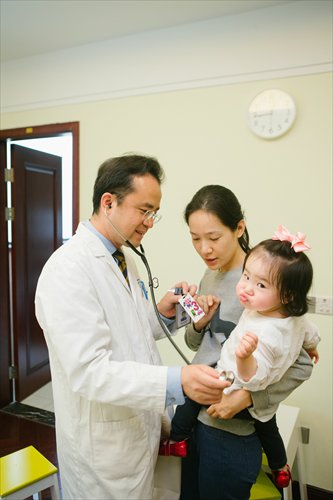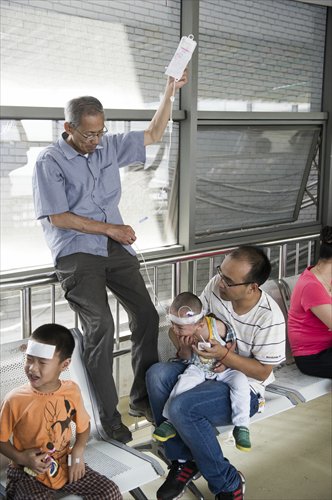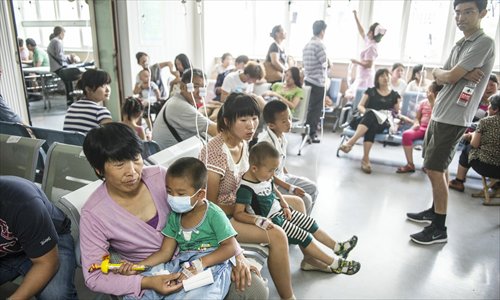HOME >> METRO BEIJING
As demand skyrockets, Chinese parents turn to the pediatric departments of private international hospitals
By Chen Ximeng Source:Global Times Published: 2016-5-3 19:53:01

Yang Ming, the deputy director of the pediatric department at Beijing United Family Hospital, gives a checkup to one-and-a-half-year-old Meredith who is held by her mother, Kathy Wang. Photo: Li Hao/GT
Most toddlers aren't big fans of getting shots, but for one-and-a-half-year-old Chinese tot Meredith, last Thursday's vaccinations at the Beijing United Family Hospital (BUFH) were a breeze.
"Meredith is very sensitive and has always been difficult whenever she needed to get checkups," said her mother, 30-year-old Kathy Wang. "Fortunately, the doctors here are very patient and gentle. They would play with her first, and then once my daughter was distracted, they managed to give her the vaccinations and checkup." Even more surprising, Meredith doesn't seem to have minded. "She loves coming here because of all the play areas. She thinks of it just like kindergarten."
While the majority of Chinese parents generally choose local public hospitals for their children's healthcare, Wang is part of a growing number of Beijing residents opting for the pediatric services of international hospitals.
Wang initially took Meredith to public hospitals to see the pediatricians there, but the overcrowding, short doctors' visits and chaotic system, which she feared could lead to infection or even doctor errors, were enough to convince her to check out international hospitals. She was immediately hooked on their better service and environment.
But it isn't just the difference in service that has more and more parents turning to international hospitals; in recent years, a growing number of Chinese hospitals have been cutting back on their pediatric services due to a shortage of doctors.
Among the latest hospitals to do so is Beijing's Haidian Hospital, which, according to a report by the People's Daily on April 26, canceled its nighttime emergency pediatric service (midnight-8 am) due to a lack of doctors.
The shrinking number of pediatricians coupled with growing demand for their services has led to a situation that many parents find untenable: long waits for sub-par care, which, in the case of a sick child, could have serious consequences. This is part of why more and more Chinese parents are turning to international hospitals.


More Chinese parents are seeking out pediatricians at international hospitals, as they offer a better environment and better doctor-patient communication. Photos: Li Hao/GT
China's growing shortage of pediatricians
Wang still remembers the evening when her daughter suddenly came down with a fever last year. She took her to the emergency department at the Beijing Children's Hospital, but when she arrived, she found that there were only two doctors and over 100 patients in line ahead of her, which meant that they would have to wait four or five hours to see the doctor.
"After taking her temperature, which read 39 C, the triage nurse gave her some antipyretics, saying that it was not very serious and that we should just wait," Wang said. "Seeing how sick Meredith felt and knowing that all we could do was wait, I really felt like I was about to lose it."
Liu Huan is another Beijing parent who prefers taking her child, a six-year-old boy named Yoyo, to international hospitals.
Liu recalled that when Yoyo was two years old, he developed a special allergy that threatened his physical development. After spending a long time on a waiting list, she got the chance to see a specialist at the Children's Hospital of the Capital Institute of Pediatrics in Beijing, but the appointment was rushed, with the pediatrician saying that there was no good cure for the allergy, and that Yoyo should simply try to avoid coming into contact with the allergen.
"The pediatrician did not have a good attitude and didn't resolve the problem," said Liu. She then took Yoyo to an international hospital, where they found a very good pediatrician who gave her more detailed instructions and suggestions. In the end, the allergy was cured.
"At international hospitals, you have more time with the doctors, who are more patient," said Liu.
"The biggest reason behind the closing of outpatient pediatric services is the growing shortage of pediatricians," said Yang Ming, deputy director of the pediatric department at BUFH, who once worked at Beijing Children's Hospital.
"According to statistics, China is home to 230 million children under the age of 14, but only 118,000 pediatricians, which is about 5.3 doctors for every 10,000 children. The ratio in America, meanwhile, is 14.6 pediatricians for every 10,000 children. We still need at least another 200,000 pediatricians to fill the gap."
Thanks to China's new two-child policy, Yang added, the demand for the country's already tight supply of pediatricians is expected to grow even stronger.
Why choose international hospitals?
But it isn't just issues of supply and demand that are causing Chinese parents to turn to international hospitals, it's what some see as their superior care.
Meredith's father, 32-year-old Zhang, recounts one instance in which his daughter was experiencing inflammation of her eyelids, and the pediatrician at a Triple A Chinese hospital prescribed antibiotics.
Zhang, however, was reluctant, worried that antibiotics could harm his child. He then sought a second opinion at an international hospital, which recommended that they use artificial tears, which was a safer alternative with fewer side effects.
In recent years, there have been a number of reports of doctors over-prescribing or misusing children's medicine, including the unnecessary use of antibiotics by pediatricians at some public hospitals. This, in turn, has raised concerns over their qualifications.
"The traditional thought is that as soon as children catch a cold or fever, they should start taking medicine, including antibiotics, just to be safe," said Lin Hua (pseudonym), who works at the pediatric department of an international hospital in Beijing. "This is over-treating, which is not right."
Lin explained that one reason for overtreatment is that some doctors' incomes are related to how much their patients spend on medication, which means they tend to prescribe more, including expensive antibiotics.
By contrast, at international hospitals, where there is no such tie between doctors' salaries and medication fees, patients receive fewer prescriptions.
"These days young parents have a better understanding of medical knowledge and more caution, so we have higher standards for pediatricians," said Zhang.
"I tend to trust international hospitals more, as they are more careful in terms of prescribing medications and choosing treatment."
Yang has also noticed a significant increase in the number of Chinese parents bringing their children to the hospital's pediatric department. When the hospital first opened in 1997, he said, the majority of parents were foreign.
"Over the past five years, the number of Chinese parents has risen to over 70 percent due to their growing economic power, wider coverage of commercial insurance, limited resources of public hospitals and increased consciousness among young parents about innovative forms of medicine."
In an attempt to keep pace with the increase in Chinese patients, BUFH has been expanding its pediatric department, with its number of pediatricians having doubled over the past several years, said Yang.
"There has been a great influx of Chinese pediatricians from public hospitals to international hospitals due to the better pay, lighter workload and more relaxed patient-doctor relationship," said Yang.
The hospital's full-time pediatricians all come from Triple A pediatric hospitals such as Beijing Children's Hospital or were attending doctors at the pediatric departments of Triple A hospitals with overseas backgrounds. So far, they have not yet faced a shortage of pediatricians and are still absorbing new talent, he added.
Concerns of parents
Zhang said that one of the biggest concerns related to international hospitals is the expense.
"In order to register to see a pediatrician at a public hospital, you only need to pay several yuan. But at international hospitals, the registration and service fees are at least 1,000 yuan ($155), which is out of reach for many Chinese people," said Zhang, who plans to buy commercial insurance for his daughter, which will enable them to get 100 percent reimbursement.
Wang also has concerns about the uneven quality of doctors across different hospitals or even different locations of the same hospital.
Wang said that one international medical center in Beijing that she visited had only three pediatricians, and cited concerns that the quality of care at international hospitals' outposts might not be as good as that at their headquarters.
She recalls one instance in which she visited a clinic to get a checkup for her daughter, and was disappointed by the doctor's rushed assessment and reluctance to answer her questions.
There's no question that international hospitals offer better environments, service and equipment, but one of their biggest challenges is a lack of specialists, said Lin. However, multi-sited licenses (which allow doctors to practice at multiple locations) might help with that.
For instance, BUFH and Beijing Amcare Women's and Children's Hospital now have pediatricians with multi-sited licenses from Triple A hospitals.
In November 2014, the guidelines for licensed doctors practicing medicine at multiple sites was launched by the National Health and Family Planning Commission. It is aimed at offering a more even quality of care between big and small hospitals, and public and private hospitals, which include international hospitals.
Since the initiative was launched on a trial basis in Beijing in 2011, 8,177 doctors, including pediatricians, have registered multi-sited licenses as of the end of November 2015, among whom 40 percent chose private hospitals as their second site for practicing medicine, the China News Service reported this January.
"International hospitals are still emerging and expanding," said Lin.
"As multi-sited licenses spread to more places to promote resource sharing and the integration of international and public hospitals, children no longer need to be transferred and can also see more specialists from Triple A hospitals at international hospitals."
Newspaper headline: A new source for primary care
Posted in: Metro Beijing